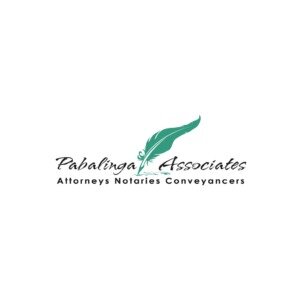Best Energy, Environment & ESG Lawyers in Botswana
Share your needs with us, get contacted by law firms.
Free. Takes 2 min.
Or refine your search by selecting a city:
List of the best lawyers in Botswana
About Energy, Environment & ESG Law in Botswana
Energy, Environment & ESG (Environmental, Social and Governance) law in Botswana encompasses a range of rules and regulations that govern how businesses and individuals interact with the environment, manage natural resources, and adhere to sustainable and ethical practices. As Botswana continues to grow economically, these legal areas play a crucial role in balancing development, the use of energy resources, and the preservation of the environment. ESG also captures more recent requirements for corporate responsibility, transparency, and ethical governance, which are increasingly prioritized by investors and regulators in Botswana and globally.
Why You May Need a Lawyer
There are several situations where individuals or businesses in Botswana may require legal assistance in the fields of Energy, Environment & ESG. Common scenarios include:
- Starting or expanding energy projects, such as mining, solar, or other renewables
- Acquiring licenses or permits for environmental use or exploitation of natural resources
- Facing investigations or enforcement actions from regulators regarding environmental or energy law violations
- Dealing with land use and environmental impact assessments
- Negotiating investment contracts with ESG obligations
- Addressing community or stakeholder disputes regarding project impacts
- Ensuring corporate activities comply with ESG frameworks and reporting standards
- Seeking clarification of changing policies on energy regulation or resource management
- Litigation or defense in environmental damage claims
- Mergers or acquisitions where ESG due diligence is required
A lawyer with expertise in these areas helps navigate complex regulations, minimizes risk, and ensures compliance to avoid costly disputes or penalties.
Local Laws Overview
The primary legal framework for Energy, Environment & ESG in Botswana comprises several statutes and policy documents. Key aspects include:
- Environmental law: The Environmental Assessment Act and related regulations require businesses or projects with potential environmental impact to undergo environmental impact assessments (EIAs) overseen by the Department of Environmental Affairs.
- Energy regulation: The Botswana Energy Regulatory Authority (BERA) oversees licensing, compliance, and monitoring of the electricity sector and energy providers. Policies encourage both conventional and renewable energy initiatives.
- Mining and natural resources: The Mines and Minerals Act sets requirements for responsible resource extraction, land restoration, and EIA compliance. Other acts govern water, forestry, and wildlife preservation.
- ESG frameworks: While ESG reporting is not yet mandatory across all sectors, larger companies, especially those with foreign investors or listing requirements, are increasingly adopting ESG disclosure, labor standards, and anti-corruption practices under various local and international guidelines.
- Community rights and compensation: Laws require consultations and compensation for communities affected by certain energy and mining projects, particularly on tribal or customary land.
Adherence to these laws and policies plays a significant part in resource sustainability, business reputation, and investment attractiveness.
Frequently Asked Questions
What are the main environmental laws I need to be aware of in Botswana?
You should focus on the Environmental Assessment Act, Waste Management Act, Water Act, and Wildlife Conservation and National Parks Act. These laws regulate how businesses interact with the environment and protect natural resources.
Do I need an environmental impact assessment for my project?
Most projects with significant environmental or social impact will require an environmental impact assessment (EIA). These are reviewed and approved by the Department of Environmental Affairs before work can begin.
Who regulates the energy sector in Botswana?
The Botswana Energy Regulatory Authority (BERA) is responsible for overseeing the electricity supply industry, including licensing, compliance, and consumer protection.
Are there incentives for renewable energy in Botswana?
Yes, government policies and recent tenders have promoted private sector investment in solar and other renewable energy projects. Various tax incentives and licensing opportunities may be available for clean energy ventures.
What is ESG, and why is it becoming important in Botswana?
ESG stands for Environmental, Social, and Governance. It refers to a set of standards that a company uses to operate responsibly. Investors are increasingly factoring ESG into decisions, and Botswana businesses are starting to embrace ESG to stay competitive and meet global standards.
What happens if I fail to comply with environmental regulations?
Noncompliance may result in fines, suspension of licenses, legal action, or requirements to remedy environmental damage. Regulatory action can delay or shut down projects and affect business reputation.
Can communities object to energy or mining projects?
Yes. Community consultations are mandated for projects on tribal or customary land, and affected parties can raise objections during the EIA process. Ensuring proper stakeholder engagement is crucial for project approval.
What should I do if my land is affected by a new project?
You should seek legal advice immediately to understand your rights regarding compensation, consultation, and any objection processes. There are provisions for fair compensation and resettlement in the law.
Are ESG disclosures mandatory for companies in Botswana?
ESG disclosures are not yet mandatory for all companies but are increasingly required by investors and for companies listed on foreign exchanges. Best practice is to voluntarily report ESG activities.
How can I ensure my business is ESG-compliant in Botswana?
Engage legal counsel specializing in ESG, implement internal policies addressing environmental, labor, and governance standards, monitor international best practices, and stay updated on local legislation and reporting requirements.
Additional Resources
Several organizations and bodies can provide support and guidance in Energy, Environment & ESG matters in Botswana:
- Botswana Ministry of Environment and Tourism
- Department of Environmental Affairs
- Botswana Energy Regulatory Authority (BERA)
- Botswana Investment and Trade Centre (BITC)
- Botswana Chamber of Mines
- Botswana Institute for Development Policy Analysis (BIDPA)
- Civil society organizations focused on environment and sustainability
- Registered law firms with expertise in energy and environmental law
Next Steps
If you believe you need legal advice or assistance in Energy, Environment & ESG in Botswana, follow these steps:
- Gather all relevant documentation, including project plans, licenses, permits, and correspondence with authorities
- Identify the specific issue or legal question you have
- Contact a law firm or lawyer with relevant experience in energy, environmental, or ESG law in Botswana
- Prepare a clear summary of your situation to discuss with your lawyer
- Stay updated on any changes to laws or regulations that might affect your case
Remember, early legal advice can help you avoid costly delays, penalties, or disputes and ensure compliance with all the relevant regulations in Botswana’s rapidly evolving legal environment.
Lawzana helps you find the best lawyers and law firms in Botswana through a curated and pre-screened list of qualified legal professionals. Our platform offers rankings and detailed profiles of attorneys and law firms, allowing you to compare based on practice areas, including Energy, Environment & ESG, experience, and client feedback.
Each profile includes a description of the firm's areas of practice, client reviews, team members and partners, year of establishment, spoken languages, office locations, contact information, social media presence, and any published articles or resources. Most firms on our platform speak English and are experienced in both local and international legal matters.
Get a quote from top-rated law firms in Botswana — quickly, securely, and without unnecessary hassle.
Disclaimer:
The information provided on this page is for general informational purposes only and does not constitute legal advice. While we strive to ensure the accuracy and relevance of the content, legal information may change over time, and interpretations of the law can vary. You should always consult with a qualified legal professional for advice specific to your situation.
We disclaim all liability for actions taken or not taken based on the content of this page. If you believe any information is incorrect or outdated, please contact us, and we will review and update it where appropriate.
Browse energy, environment & esg law firms by service in Botswana
Botswana Attorneys in related practice areas.
Browse energy, environment & esg law firms by city in Botswana
Refine your search by selecting a city.















